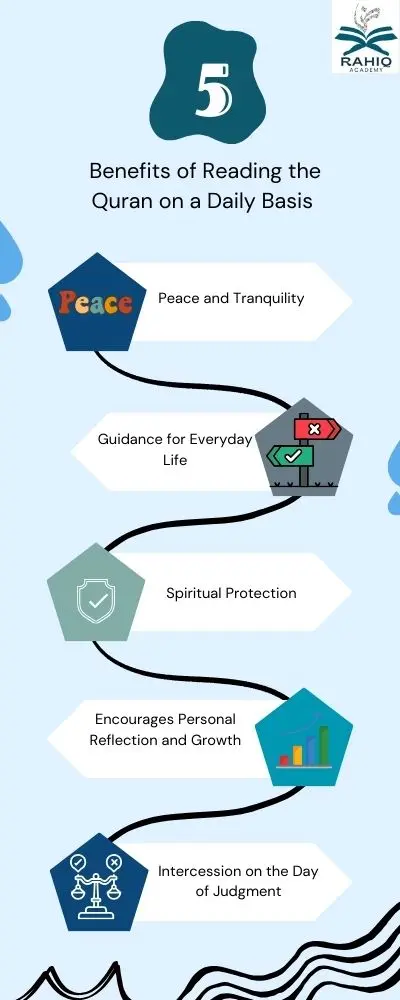Quran is the final revelation from Allah, sent as guidance for all of humanity.
Muslims interact with this divine text in two primary ways, reading and reciting. While these terms might seem similar, they carry distinct meanings and serve different purposes.
Reading the Quran is often a personal, reflective activity, while reciting it involves a more vocal and rhythmic practice, especially with tajweed (rules of correct pronunciation).
Both are important in their own ways, but understanding the difference between reading and reciting quran helps Muslims appreciate the beauty and depth of engaging with the Quran.
5 Benefits of Reading the Quran on a Daily Basis

Reading the Quran daily offers a wide range of benefits, impacting not only a person’s spiritual life but also their mental and emotional well-being. Here’s some
Benefits of Reading the Quran on a Daily Basis and why you should make reading the Quran a regular part of your routine:
1-Peace and Tranquility
The Quran is a source of calm for the soul. Life’s challenges can sometimes be overwhelming, but reading the Quran provides a sense of peace and tranquility that nothing else can match. Allah tells us in the Quran:
“أَلاَ بِذِكْرِ اللَّهِ تَطْمَئِنُّ الْقُلُوبُ”
“Verily, in the remembrance of Allah do hearts find rest)
(Surah Ar-Ra’d, 13:28)
Taking just a few minutes every day to read even a small portion of the Quran can help put your heart at ease, offering clarity and calm in a chaotic world.
2-Guidance for Everyday Life
The Quran is not just a book of worship; it is also a manual for living a righteous life. Its verses contain advice and guidance for everyday life, on everything from personal behavior to how to interact with others. Allah says:
“ذَٰلِكَ الْكِتَابُ لَا رَيْبَ ۛ فِيهِ هُدًى لِلْمُتَّقِينَ”
“This is the Book about which there is no doubt, a guidance for those conscious of Allah.”
(Surah Al-Baqarah, 2:2)
Whether you’re seeking answers to personal dilemmas or trying to navigate complex relationships, the Quran offers timeless guidance that applies to every aspect of life.
3-Spiritual Protection
Reading the Quran regularly serves as a protection against harmful influences, both seen and unseen. The Prophet Muhammad (peace and blessings be upon him) said:
“اقْرَءُوا الْقُرْآنَ فَإِنَّهُ يَأْتِي يَوْمَ الْقِيَامَةِ شَفِيعًا لِأَصْحَابِهِ”
“Recite the Quran, for it will come as an intercessor for its companions on the Day of Judgment”
(Sahih Muslim)
Reading the Quran daily surrounds you with the mercy and protection of Allah, making it an essential part of a believer’s spiritual Protection.
4-Encourages Personal Reflection and Growth
When you read the Quran, it’s not just about finishing verses or completing a chapter. It’s about reflecting on the message and applying it to your life. The Quran encourages self-improvement and helps you evaluate your actions. By reading it regularly, you can constantly strive to be a better version of yourself.
5-Intercession on the Day of Judgment
One of the greatest rewards of reading the Quran is its promise of intercession on the Day of Judgment. The Prophet Muhammad (peace be upon him) said:
“يُؤْتَىٰ بِالْقُرْآنِ وَأَهْلِهِ الَّذِينَ كَانُوا يَعْمَلُونَ بِهِ فِي الدُّنْيَا تَقْدُمُهُ سُورَةُ الْبَقَرَةِ وَآلَ عِمْرَانَ”
“The Quran and its people who acted upon it will be brought on the Day of Resurrection, preceded by Surah Al-Baqarah and Aal-‘Imran”
(Sahih Muslim)
Daily engagement with the Quran brings unimaginable rewards, both in this life and in the Hereafter.
How Much Quran Should You Read Daily?

The question of how much Quran should you read daily? varies from person to person. The beauty of the Quran is that there’s no fixed requirement; it’s about consistency and intention.
Finding a Balance
Some early generations of Muslims (Salaf) completed the entire Quran in as little as three days. However, the Prophet Muhammad (peace be upon him) recommended against completing it in less than three days to ensure time for proper reflection.
“فَاقْرَءُوا مَا تَيَسَّرَ مِنْهُ”
“So recite what is easy from the Quran”
(Surah Al-Muzzammil, 73:20)
A common practice is to read one juz’ (one-thirtieth of the Quran) per day, which allows you to complete the Quran in a month, especially during Ramadan. However, even a few verses read with sincerity can have a profound impact.
Consistency Over Quantity
The Prophet Muhammad (peace and blessings be upon him) advised:
“أَحَبُّ الْأَعْمَالِ إِلَى اللَّهِ أَدْوَمُهَا وَإِنْ قَلَّ”
“The most beloved of deeds to Allah are those that are most consistent, even if they are few”
(Sahih Al-Bukhari)
Rather than focusing on how much Quran you can read, prioritize reading regularly. Even if you can only manage a few verses a day, it’s better than reading large portions sporadically.
Adapt to Your Capacity
Every Muslim has different capacities and life circumstances. For some, reading a full juz’ daily may be feasible, while others may only have time for a few verses. The key is to read what you can manage consistently, ensuring it remains a positive part of your daily routine.
What Are the Manners of Reciting the Quran?
Reciting the Quran is more than just vocalizing its verses; it requires mindfulness and respect. Proper manners, known as “adab”, elevate the act of recitation, making it a more meaningful form of worship.
Purity and Cleanliness
Before reciting the Quran, a Muslim should be in a state of wudu (ablution) to show respect for Allah’s words.
“لَا يَمَسُّهُ إِلَّا الْمُطَهَّرُونَ”
“None touch it except the purified”
(Surah Al-Waqi’ah, 56:79)
Cleanliness, both physically and spiritually, is essential when engaging with the Quran.
Seeking Refuge from Satan and Starting with Bismillah
Before beginning recitation, it’s important to seek Allah’s protection from the devil by saying:
“أَعُوذُ بِاللَّهِ مِنَ الشَّيْطَانِ الرَّجِيمِ”
“I seek refuge with Allah from the accursed devil”
Follow this by reciting:
“بِسْمِ اللَّهِ الرَّحْمَٰنِ الرَّحِيمِ”
“In the name of Allah, the Most Gracious, the Most Merciful.”
Recite with Humility and Reflection
When reciting, it’s important to approach the Quran with a humble heart and reflect on its meaning. Allah describes the true believers in the Quran:
“الَّذِينَ إِذَا ذُكِرَ اللَّهُ وَجِلَتْ قُلُوبُهُمْ”
“Those who, when Allah is mentioned, their hearts tremble”
(Surah Al-Anfal, 8:2)
Recitation should be done slowly and thoughtfully, allowing the words to resonate and inspire reflection.
Proper Pronunciation with Tajweed
One of the most important aspects of recitation is the proper pronunciation of the Quran, known as tajweed. Allah commands:
“وَرَتِّلِ الْقُرْآنَ تَرْتِيلًا”
“And recite the Quran with measured recitation.”
(Surah Al-Muzzammil, 73:4)
Reciting with tajweed ensures that the beauty and integrity of the Quran are preserved.
Listen Attentively to Quranic Recitation

When the Quran is recited by others, it is important to listen attentively and respect the words of Allah.
“وَإِذَا قُرِئَ الْقُرْآنُ فَاسْتَمِعُوا لَهُ وَأَنْصِتُوا لَعَلَّكُمْ تُرْحَمُونَ”
“When the Quran is recited, listen to it and be silent that you may receive mercy.”
(Surah Al-A’raf, 7:204)
Listening carefully helps one internalize the message and draw closer to Allah.
Conclusion
Reading and reciting the Quran are two deeply rewarding acts of worship, each with its unique significance. Reading allows for reflection and understanding, while reciting brings out the melodic and spiritual beauty of Allah’s words.
Discovering the difference between reading and reciting Quran help to Engage with the Quran which is brings peace and guidance and helps believers build a strong connection with their Creator.
To perfect your recitation and master the rules of tajweed, consider enrolling in the Quran Tajweed Course at Rahiq Academy.
With expert teachers guiding you step-by-step, you can enhance your Quranic experience, ensuring that your recitation is both beautiful and correct. Start your journey today with Rahiq Academy and strengthen your connection to the Quran.




